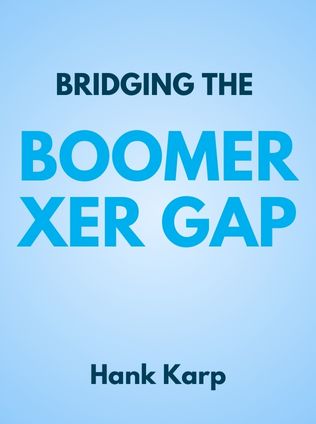
Bridging the Boomer-Xer Gap
Creating Authentic Teams for High Performance at Work
By Hank Karp,
Published 02/2002
About the Authors
Hank Karp, Ph.D., is an author, educator, and consultant with expertise in organizational behavior and development. He has extensive experience in facilitating team-building and leadership development workshops.
Connie Fuller, Ph.D., is an organization development specialist with AG Communication Systems. Her work focuses on enhancing team performance and leadership within organizations.
Danilo Sirias, Ph.D., is an assistant professor of management at Saginaw Valley State University. He specializes in management and organizational behavior, particularly in the context of team dynamics and leadership.
Main Idea
"Bridging the Boomer-Xer Gap: Creating Authentic Teams for High Performance at Work" by Hank Karp, Connie Fuller, and Danilo Sirias explores the generational differences between Baby Boomers and Generation Xers in the workplace. The book offers strategies to bridge these gaps by building authentic teams that leverage the unique strengths of each generation to achieve high performance.
Table of Contents
- Baby Boomers and Generation Xers at Work
- Studies Outline Xer and Boomer Characteristics
- A Different View of Teams
- Building Authentic Teams
- Supporting Authentic Teams
- The Authentic Approach to Problem Solving
- Working with the Adversary Relationship
- Retaining Generation Xers
Baby Boomers and Generation Xers at Work
Today's workplaces are dominated by two generational groups: Baby Boomers and Generation Xers. Boomers, born between 1945 and 1962, hold top management and policy-making positions. Generation Xers, born between 1963 and 1982, have recently entered the workforce. Unfortunately, both groups view each other with suspicion. Boomers believe Xers are slackers, while Xers think Boomers are resistant to change.
"The old-timers won't change" and "the kids won't work" are fighting words. The attitudes behind the words represent a serious threat to workplace effectiveness." – Hank Karp, Connie Fuller, and Danilo Sirias
The Boomers' formative years were shaped by events like the Vietnam War, which influenced their work ethic and respect for authority. They believe in loyalty to their employers and view work as a significant part of their identity. On the other hand, Xers have grown up in a time of technological advancement and economic uncertainty. They value work-life balance and are skeptical of long-term loyalty to employers due to witnessing layoffs and corporate downsizing.
- Boomers valuing loyalty and a strong work ethic.
- Xers emphasizing work-life balance and technological proficiency.
- Boomers' motto of "live to work" versus Xers' "work to live."
Studies Outline Xer and Boomer Characteristics
Two groundbreaking studies reveal that while Boomers and Xers have different values, both groups can be highly team-oriented. The first study showed that Xers were more team-oriented than Boomers, while the second study confirmed that Xers also valued individualism. This duality of valuing both teamwork and individualism presents a unique challenge and opportunity for managers.
Sign up for FREE and get access to 1,400+ books summaries.
You May Also Like
How To Win Friends and Influence People
The All-Time Classic Manual Of People Skills
By Dale CarnegieQuiet: The Power of Introverts
The Power of Introverts in a World That Can't Stop Talking
By Susan CainThe Lean Startup
How Today's Entrepreneurs Use Continuous Innovation to Create Radically Successful Businesses
By Eric RiesWho Moved My Cheese?
An Amazing Way to Deal with Change in Your Work and in Your Life
By Spencer Johnson, M.D.Make Your Bed
Little Things That Can Change Your Life...And Maybe the World
By William H. McRaven



















